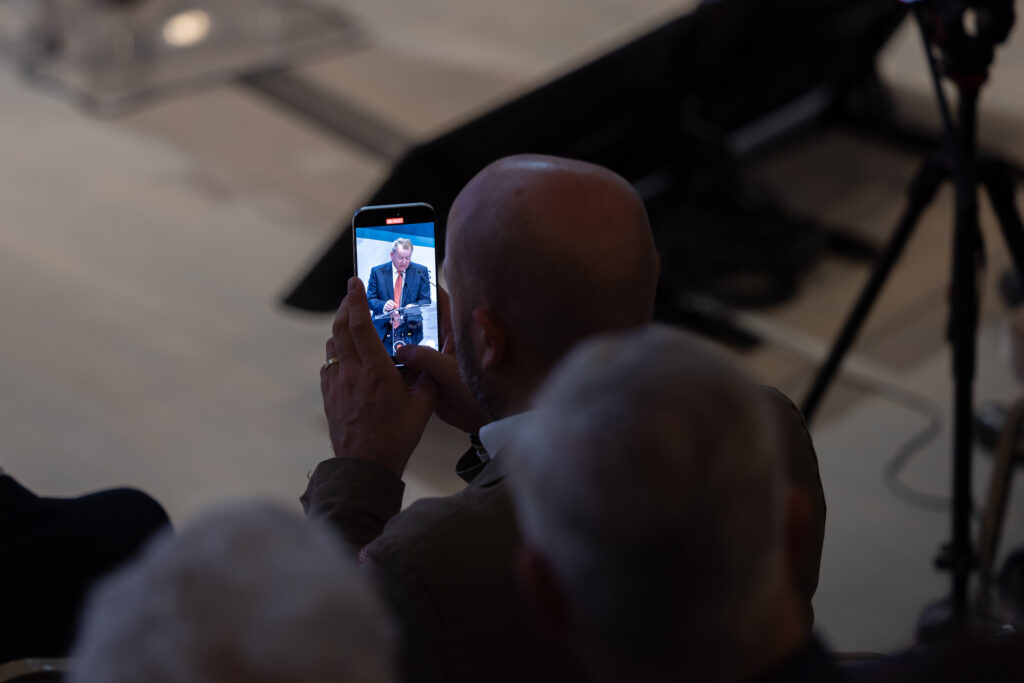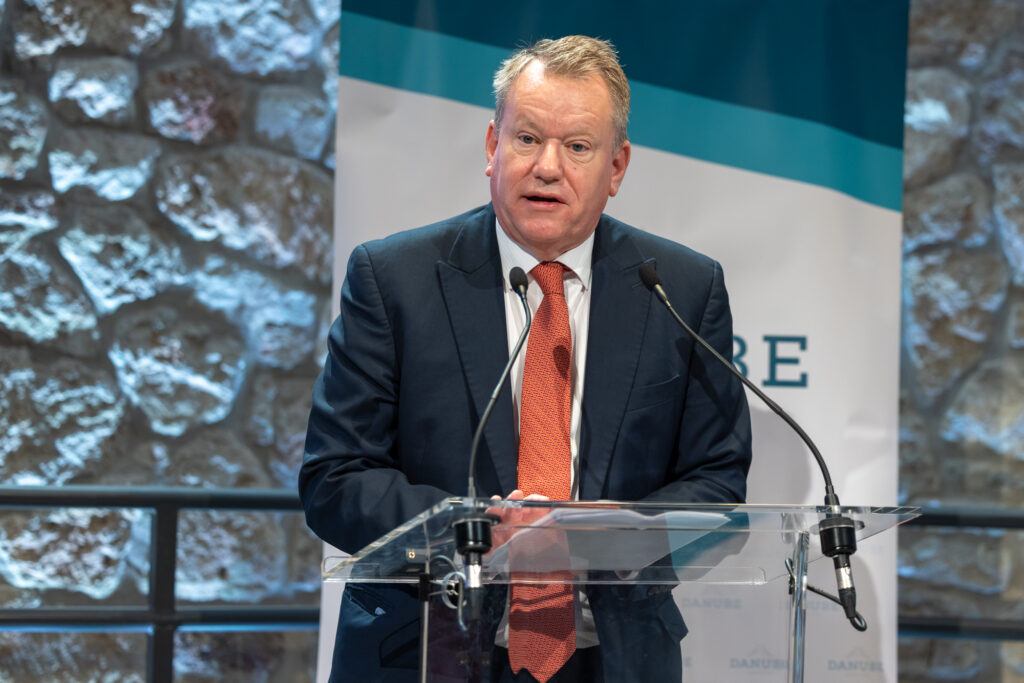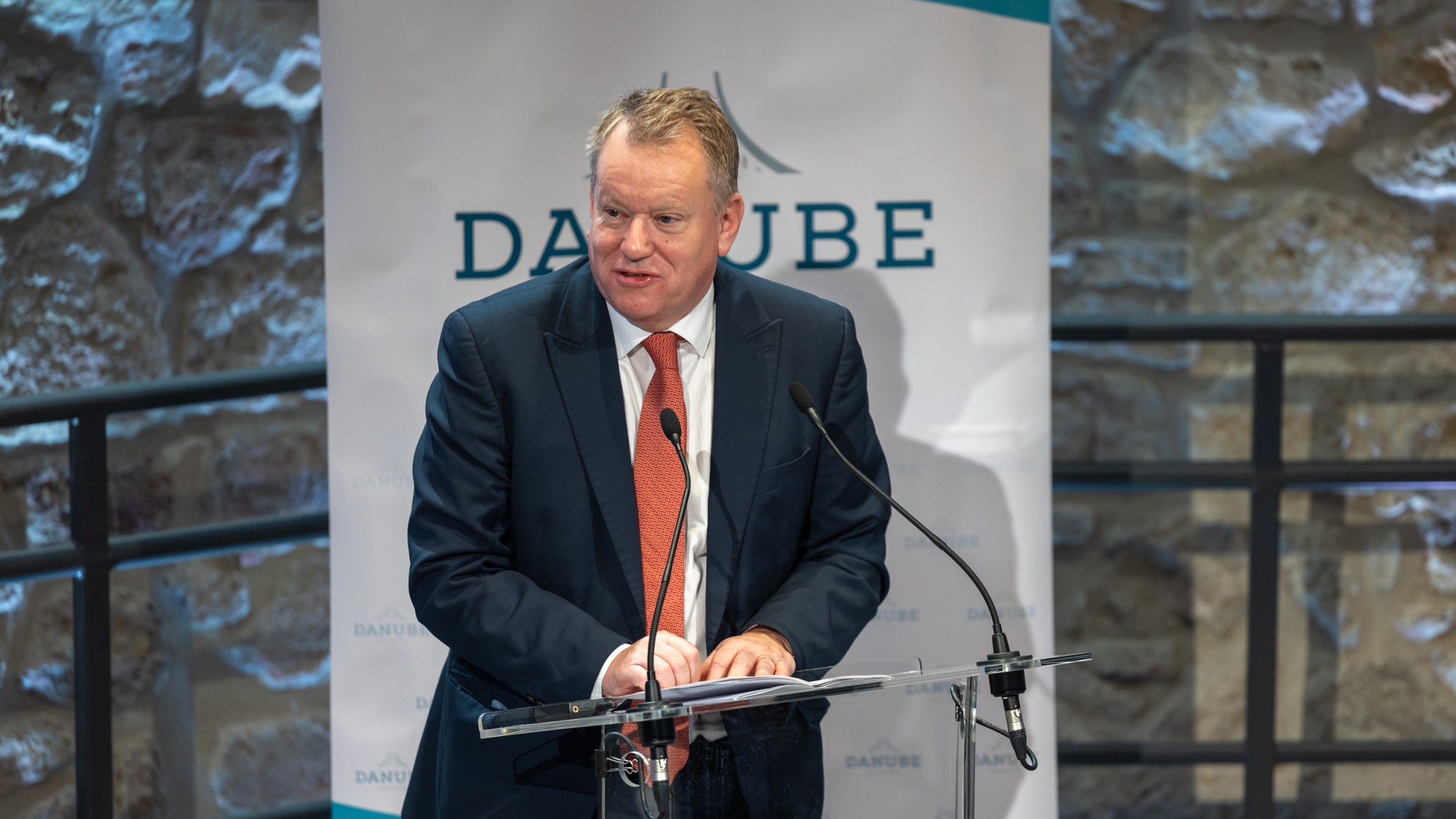Keynote speech by the Rt Hon David Frost, Lord Frost of Allenton CMG delivered at the Danube Institute conference titled Trump 2.0: Foreign Policy Implications of the U.S. Elections held on 19 November 2024.
President Trump’s election is a turning point. If his administration succeeds, it will change the world. If it doesn’t, it will be a decisive defeat for those of us who want to renew and rebuild Western civilisation on the basis of our history, our traditions, and our strengths. Conservative forces around the world need to react accordingly. This is not a moment to sit things out, it’s a time to get involved.
So this is a moment of huge potential, a massive opportunity for conservative movements across the world. The atmospherics are very different to 2016: the new administration’s team is clearly much better prepared, and the President has the moral authority of having won the election decisively. If his administration can make progress as he has signalled then it is going to be a powerful encouraging signal against decline and for conservatism and Western civilisation more broadly.
It would also start to overcome what is perhaps one of the Left’s biggest advantages in resisting change just now, the sense that some problems are simply intractable and must just be lived with. So if there can be real progress on, for example, deporting large numbers of illegal immigrants and genuinely closing the southern border, genuinely reversing the trend on ‘woke’ policy-making and DEI, or achieving serious large-scale cuts in government spending, it will have a very powerful real-world effect for the rest of us. In an ideal world we will see something like the mood of the 1980s in which US ideas leadership rallies conservative forces across the world.
This will be reinforced further if, as seems to be the intention and as I would hope, the Administration puts out a lot of inside information about the handling of the pandemic, gain of function experiments, vaccines, and obviously about how the intelligence and domestic security agencies have conducted themselves more broadly. This could really discredit the old ways of doing things and offers the chance of a really decisive break with the past.

I believe, and hope, that this moral effect, this galvanising power for conservatives, will be the biggest consequence in the long run at a global level of President Trump’s re-election. But there will of course be short term shifts too, to which every country will need to respond.
As regards US foreign policy, the broad outlines of change seem clear. We will see a shift in relative US attention away from Europe and of course the Ukraine War, to some extent away from the Middle East—balanced in that case by stronger and less conditional support for Israel–and towards a more determined effort to mobilise US strength to push back against China. We will see an effort to rely more on, and ask more of, local allies, with as a result a different pattern of friendships building up around the world, not necessarily a particularly ideological one. And I suspect we will see increased suspicion of international organizations and treaties, with withdrawal at least from the WHO and the Paris climate agreement on the cards.
‘We will see a shift in relative US attention away from Europe and of course the Ukraine War, to some extent away from the Middle East’
More important even than these shifts will, I suspect, be a change in philosophy. There will be not only a move towards foreign policy realism, but, I hope, also away from what I think of as ‘existentialism’. By this term I mean the tendency the West has drifted into over the last couple of decades to see first best outcomes—often but not always outcomes dictated by the interplay of international conventions and courts, the rules based system—as the only acceptable outcomes to foreign policy problems. It’s a tendency to be very black and white about possible solutions to problems and to downplay the values of deal-making and pragmatism.
This approach is of course in many ways a hangover from the so-called ‘unipolar moment’ of the 90s and the nation building approach of the 2000s, when the US and the West, for a time, had the ability to impose solutions, up to a point. But it is now well out of line with our real power in the world and our ability to solve foreign policy problems in the way we wish.
For example, one hears certain Western diplomats and commentators arguing that the only acceptable outcome to the Ukraine war is the recovery of all Ukraine’s territory and the collapse of the Putin regime—‘because Europe can’t live with the threat of Russia’.
We often hear the same argument about Iran—we can’t live with the Iranian threat and therefore the regime must be overthrown. One must acknowledge too that there is an element of this on the US Right as regards China—a sense that a confrontation is inevitably coming and we must be ready for it.
I would guess—though nothing is certain—we will see a lot less of this hubris under Trump. For all the professed hostility to China, in fact China has been handled in quite a realist way, and I would expect this to continue under Trump—with an acceptance that China exists, is likely to be hostile to an extent, and yet the relationship must be managed. I suspect, over time, that the relationship with Russia will shift this way too, and perhaps, once the immediate Middle East crisis is over, so too with some of Israel’s more hostile neighbours as the Abraham Accords come back into play.
This does not mean a reluctance to make moral judgements—indeed it makes doing so all the more necessary.
Nor does it mean accommodation to those regimes and their ends: it should mean more effective deterrence and there could easily be a violent edge at times to all the relationships I have mentioned—one thinks of the clash between the US and the Wagner group in 2018 in Syria for example, or the killing of Soleimani in 2020.
But it does mean that managing the relationships in a political way is prioritised, based on very clear cost/benefit analyses, and in a way that is consistent with the potential risks of not doing so.
There is nothing new in this—it is reminiscent of the Cold War, when policy makers made clear moral distinctions, saw themselves as in competition, but still kept lines open, saw the risks of being purist, and recognised more readily that stakes were high.
I could of course be wrong, but I would expect to see much more of this approach under Trump. If so, it will be difficult for many Europeans—and indeed Brits: I’ll come to us—to accept, seeing ourselves as we do as the self-professed champions of the rules based international order and international institutions.
‘Many Europeans privately want the war to end while being able to blame Trump for a settlement reached on less than perfect terms’
More than that, it is very likely to expose the hollowness of much European and specifically EU foreign policy, and especially so on Ukraine. Europeans now face a difficult choice if Trump does make a serious effort to find a de-escalation if not a permanent settlement. After all most Europeans have insisted that their own security, European security, depends on Ukraine winning the war. They now face a choice between disavowing that view and supporting Trump’s efforts to find a way through; or alternatively of rejecting it and insisting on supporting Ukraine on their own, a task of which they are clearly quite incapable without the Americans. My guess is that some Europeans will go one way, some the other, and the EU’s policy will disintegrate into chaos. Indeed I suspect that many Europeans privately want the war to end while being able to blame Trump for a settlement reached on less than perfect terms.
The same European reluctance to engage with reality is visible on the defence spending issue, which must be faced up to if Europe wants to maintain a meaningful alliance with the US and keep NATO viable. My impression is that many Europeans, even now, do not get the degree of frustration and anger that exists in much of the US at defence free riding. Here too, with a few exceptions such as Poland, the EU seems to prefer to remain in its comfort zone of diverting existential problems into discussions of structures, as in the endless debate about European defence identity, a security and defence pact, and who might fund it. Maybe something more organised will in the end have to come in the EU. But the urgent need will be to increase defence spending and rapidly, and it is not obvious that discussions of new structures will do anything but divert from that effort.
It bears noting that Britain is no outlier here. We spend only slightly above 2 per cent of GDP on defence, and there is a fair bit of creative accountancy in there too. The government hasn’t even committed to a timetable to getting it to 2.5 per cent. Yet at the same time the recent UK budget chose to increase taxes over the next three years by 2 per cent of GDP, precisely the amount that would have taken our defence spending back up to Cold War type levels. Our choice was to pour it into public services instead. We too, like everyone else, must get serious.

But behind this is a bigger decision for the UK. My country is of course in a different position in the sense that we genuinely have a choice of how to react to Trump 2.0. That choice is a fundamental one and it will shape the country for years to come.
One is to tilt back to Europe: to join whatever the emergent EU foreign policy organizations are, join the Europeans in getting into a trade war in retaliation against Trump’s proposed trade tariffs, and gradually shift towards greater economic alignment with the EU again.
The other is of course to face the other way—to focus on getting a free trade agreement with the US, to deregulate and to reform away from innovation-killing EU standards, and to invest more in a globally focused foreign and trade policy, the logic of AUKUS, CANZUK, CPTPP membership, and more. There can of course be a good relationship with Europe, but we would recognise that the chances of a UK economic recovery would not be enhanced by a closer relationship with this declining bloc.
The emerging approach in London is described as ‘balancing’ between these two views. But it isn’t really balancing at all. After all we already have an FTA with the EU—I negotiated it. We have no trade agreement with the US. So a decision for the status quo is actually a decision not to balance, but instead to maintain our current Europe-focused trade and economic policy. Politically and economically that makes no sense.
‘Trump’s victory is a victory for conservative forces across the world, a victory for foreign policy realism’
Now we have a very left-wing socialist government, so what makes political and economic sense is not necessarily the top priority. Its members often have a naïve view of the EU and I fear they will use the re-emergence of Trump to help it win the domestic argument for the proposed ‘reset’ with the EU. I believe that would be a huge mistake, but our new government has made many mistakes already, and it’s easy to see them adding another to that list.
To conclude: Trump 2.0 is a huge opportunity. Of course there are risks. Of course there will be things the administration does which I will disagree with. But the big picture is what matters. His victory is a victory for conservative forces across the world, a victory for foreign policy realism and for getting our means in line with resources. As I said at the start, this could be a real turning point. We Europeans need to get real about what it means. I’m extremely excited about the next few years. They could, and should, be the herald of a transformation that will put the West in the best possible place for dealing with what will inevitably be a difficult, challenging, and often threatening world in years to come. Let’s work to make it so.
More from the Trump 2.0 event:








